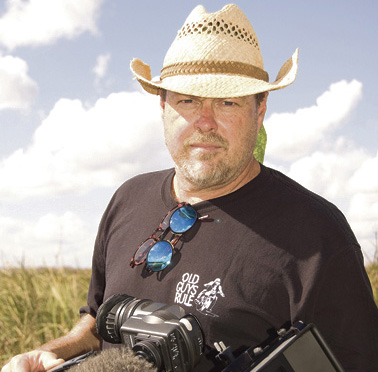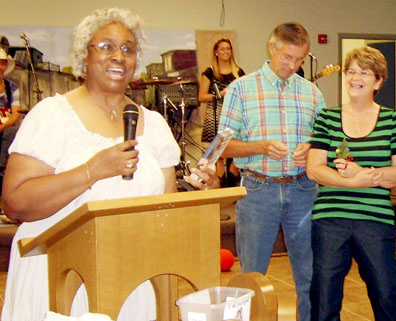
Wes Skiles is remembered by many for his pioneering work in underwater photography and filmmaking as well as environmenetal concerns.
HIGH SPRINGS – Underwater caves and passages were his second home.
Born in 1958, Florida native Wesley C. Skiles, better known as Wes, would be described by his friends and family as an explorer, an educator and a skilled storyteller whose passion was cave diving and learning about Florida's waterways. Sunday marks the third anniversary of his death while cave diving, but the legacy of the former High Springs resident is maintained by the people who knew him.
Wes was well known for his cave diving adventures and exploring Florida’s springs.
“It was like his church," said his wife, Terri Skiles.
Terri met Wes around 1980, when she was working a part-time job at a store and sold him a camera. They were married in 1981, and had two children, Nathan, 26, and Tessa, 20.
Wes was a pioneer in his photography techniques, said friend and water conservationist, Mark Long,
"He was the first photographer to get really good pictures in underwater caves," he said.
Wes' lighting techniques in particular brought vibrancy to his photographs of submerged caverns, Long said. "The cave pictures of old were kind of dull. He brought them to life."
He got into photography to show the world the size and clarity of what he saw regularly, Terri said.
"People didn't believe them when he told them how big these underground cave systems were," she said. "He loved to show what he had learned by picture taking or filmmaking,"
Wes also used his photos as proof that there were issues with the water.
"He was one of the first people to recognize problems with the springs. To prove what he was talking about, he started taking pictures," Terri said. Wes started taking water samples and talking to state officials about pollution in the 1980s. He used his skills as a diver to advance aquatic research.
By the end of his life, Wes Skiles had received awards and accolades for his photography. National Geographic featured him several times, in addition to naming him "Explorer of the Year" in 2011, the year after his death. Wes participated in a National Geographic expedition to Antarctica, where he was the first human to set foot on Iceberg B-15, the largest recorded iceberg in the world.
In 2004, the National Academy of Television Arts and Sciences awarded him the Regional Emmy award for his work directing the documentary “Water's Journey,” which tracked the path of water through Florida's aquifer, rivers and springs.
By the age of 16, Wes had drawn maps of the Florida aquifer, the network of underground waterways running beneath the state.
"I have those maps to this day," said Terri Skiles.
With only a high school diploma, he taught himself everything he could about the watershed systems in North Florida.
"He was always learning," Terri said. “He loved to share what he knew from experience.”
Wes was passionate about the environment, but he wouldn't call himself an environmentalist, she said. "He would call himself a conservationist."
Ross Ambrose, from High Springs, worked with Wes on the "Water's Journey" documentary as a producer.
"I think he was one of Florida's most passionate advocates for protecting and understanding our springs," he said. "Wes' education efforts were very encompassing."
Wes' friend, Mark Long, was involved with the documentary as well, acting as a model in front of the camera.
"It was a way to make people care about their water, how valuable it is, and how to protect it," Long said. "He had incredible knowledge on what's going underground with our water. By the end of his life, he was lecturing people with Ph.D.s on this stuff."
Wes recognized how everyone contributes to a problem without making them feel guilty, Ambrose said. "Very few people aren't part of the problem, you can't look at things in black and white and good and bad," he said. Ambrose remembered several people talking to Wes about concrete plants polluting the Suwannee River.
"He looked back at the people and said 'didn't you just build a house?'"
Wes encouraged people to find solutions, rather than to focus on the blame, he said.
Through his cave diving experience, Wes noticed pollution, algae blooms and problems with water levels. He started giving presentations at schools in the late 1980s, and by the accounts of people who knew him, he could talk to children, professors and government officials alike.
"He was a great communicator; he could talk to anybody," said Long.
"He was a crusader," said friend Jim Woods, owner of the Santa Fe Canoe Outpost in High Springs. "Early on, he saw the problems that we are now experiencing."
Although he had an impact in raising awareness for aquatic issues, his friends and family also remember him for his personality.
"He always wanted to be a kid," Terri said.
"He could have a business meeting planned, but if the surfing conditions were good in Jacksonville, he would go surfing," Ambrose said. "He very much believed in taking advantage of opportunities. You could have a business meeting anytime. You couldn't always go surfing."
"I've never once seen the guy in a bad mood," Woods said. "He always had a smile on his face."
Wes Skiles died June 21, 2010, while diving off the coast of Boynton Beach. His friends found his body at the bottom of a reef.
Despite being a scientist, adventurer, photographer and environmental advocate, his wife considers his family to be his biggest achievement. The couple went diving together many times over the course of their marriage that lasted nearly 30 years.
"He just gave me the best life I could have," she said.
"He made it an adventure for me."
# # #
Email cmckinney@
Alachuatoday.com


 ALACHUA – The city of Alachua is gearing up for a full week of softball frenzy. From Aug. 1 to Aug. 6, the Santa Fe Babe Ruth Softball organization will host the Babe Ruth Softball 12U World Series in Alachua. Hundreds of girls from around the country will be at the city’s Hal Brady Recreation Complex to compete for the title.
ALACHUA – The city of Alachua is gearing up for a full week of softball frenzy. From Aug. 1 to Aug. 6, the Santa Fe Babe Ruth Softball organization will host the Babe Ruth Softball 12U World Series in Alachua. Hundreds of girls from around the country will be at the city’s Hal Brady Recreation Complex to compete for the title. High Springs Chamber of Commerce Citizen of the Year Gloria James said it was a surprise and an honor to receive the award.
High Springs Chamber of Commerce Citizen of the Year Gloria James said it was a surprise and an honor to receive the award.
